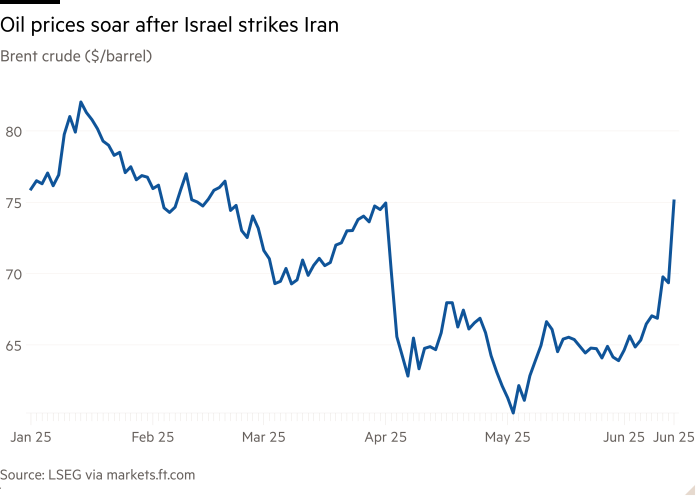Middle East upheaval comes at a bad time for the global economy

Unlock the Editor’s Digest for free
Roula Khalaf, Editor of the FT, selects her favourite stories in this weekly newsletter.
The writer is president of Queens’ College, Cambridge, and an adviser to Allianz and Gramercy
Israel’s latest attack on Iran constitutes a bad shock for the global economy at an already fragile time. It raises risks for both growth and inflation, just as the flexibility in the fiscal and monetary tools that can be deployed in response has become limited.
How serious the adverse effects prove to be will depend on the magnitude and duration of Israel’s unilateral attack and the retaliation that it triggers. But given the already high level of uncertainty, markets are responding negatively.
Oil prices are trading more than 5 per cent higher to about $70 a barrel. That is still down from January peaks of around $82 a barrel and investors will be keen to see how the Opec+ responds. But prices have been going up in recent weeks, intensifying the stagflationary winds blowing through the global economy. Stock markets have slipped, pricing in even higher uncertainty regarding economic activity, with increased risk that consumers and producers become even more hesitant.
Earlier this month, the World Bank projected a slowdown in global growth to 2.3 per cent in 2025, nearly half a percentage point lower than the rate expected at the start of the year. While it did not expect a global recession, it warned that, if forecasts for the next two years materialise, average global growth in the first seven years of the 2020s will be the slowest of any decade since the 1960s. And this was assuming an average oil price of $66 a barrel for 2025 and $61 next year amid a broader decline in commodity prices.
Central banks will now need to intensify their vigilance regarding inflationary pressures that have yet to be confidently contained. This makes it less likely that earlier and larger interest rate cuts will be triggered in response to any slowdown. Meanwhile, any fiscal response would come at a time of still-high interest rates and great investor sensitivity to deficits and debt. Budgets risk further pressures from lower tax collection and higher spending claims.
Such potential negative economic and financial effects are particularly relevant for the UK. This week’s Spending Review has highlighted not only the importance of economic growth but also the risk that already pressured households face a meaningful chance of heavier taxation in the October budget. This offsets the benefit from further Bank of England rate cuts, which are now even less certain.
The global economy also faces the risk of negative indirect effects. With time, the uncertainty arising from this new upheaval in the Middle East may well be seen as adding to the ongoing erosion of the US-led global economic order — further energising the forces of economic fragmentation. This will in turn encourage countries to trust less in the collective mechanisms of stability, pushing them instead to pursue measures to ensure greater self-resilience within their own borders. Ultimately, the efficiency of the global economy will be undermined.
It will also not go unnoticed that the two most significant global financial benchmarks, US Treasuries and the dollar, had a relatively muted initial response to the Israeli attack. Both rallied a little but neither experienced the type of “haven gains” that historical experience would lead us to expect. This also matters longer term.
Due to the lengthy influence of the US over the global economy and its long period of economic exceptionalism, much of the rest of the world is “overweight” the dollar and American assets in general. The more the US role at the centre of the global order is diminished, the greater the incentive for countries to reduce this overweight.
Whichever way you look at it in terms of economic and financial effects, this new development in the Middle East is bad news at a bad time. It reminds economies and markets that they have to deal with an increasingly unstable set of political and geopolitical factors. And it encourages a gradual migration from the existing economic architecture to one involving greater fragmentation and a higher risk of financial instability.




